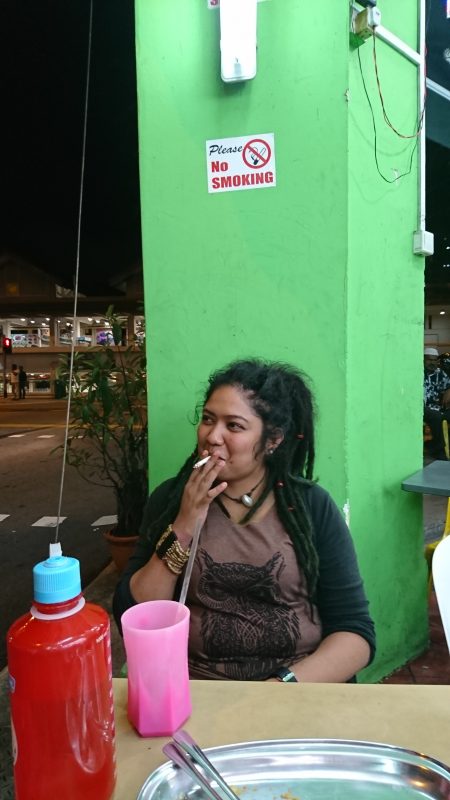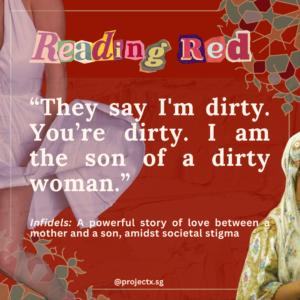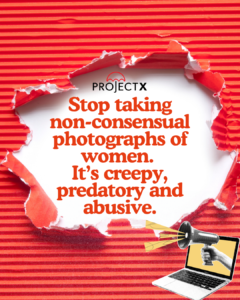
For the longest time, I had been dreading the completion of the last task that had been assigned to me – writing a personal reflection on my 3 months as Project X’s intern. I use the term ‘dread’ for many reasons; 1) I hopped onto the internship wagon with many questions in my bag. While I got most of them answered by the staff, volunteers and other stakeholders, I also picked up more questions along the way, and I felt that I needed more time to get to the answers. With more time, however, came more problems and questions. It was like opening a can of worms; 2) the two topics that will be covered in this piece were two of which that tugged at my heartstrings the most – I was dissatisfied with the position on the procedures and solutions, and the naïve me wanted to buy more time to see if there was any possibility for change, and 3) completing this last task would also mean that I was officially done with all my tasks as an intern, and it feels… bittersweet.
Throughout the 3 months of internship, I was given the opportunity to meet, communicate with, interview and help a diverse array of amazing people. Many of them were kind enough to invite me into their lives to share their heartbreaking, and/or inspirational life journeys, and it was through these conversations that I had with them, that I found out so much more about the sex work industry, the challenges and the unsolved issues that the sex workers face, as well as their coping mechanisms. I have spent many days slamming the keys on my laptop in frustration, searching for solutions in the law, making phone calls to seek help, only to be questioned unnecessarily, hung up on, or be told “this has always been the position, there is nothing else we can do”.
Nothing else we can do?
Why? If access to justice is the basic principle to the rule of law, then why does it seem as though we are so far behind in applying this principle?
I once accompanied a transgender sex worker to the police station to file for assault, and was both surprised and taken aback when the officer kept harping on why she was in a red light
district, and what was she working as. I could not help but ask the officer why this was relevant to her filing for assault. “Oh this is just protocol”, was what he replied. Sure, I understand the protocol, but would a fisherman’s case of assault be filed differently from a yoga instructor’s case of assault? Would it matter if she was unemployed or working in one of the Big 4s? Asking not once, not twice but more than three times about her occupation and reason for being in a red light district made me annoyed, and I cannot imagine the fear, annoyance, and humiliation by the person who was there to file for the report. It is the unnecessary scrutiny that makes people nervous about coming forward, for fear that the victim will also become a criminal under the eyes of the law.
Think of the individual as a piece of onion, who can get access to justice only if, every other layer of them is not against the laws of Singapore. I could be wrong, but almost every other case that comes through Project X seems to be that way. Is there really nothing else we can do?
I could go on and on about the 1001 unique cases that stream through our doors, but we would probably end up with page after page of my ranting. As such, I have forced myself to choose two topics that have impacted me during my internship, as part of my farewell article.
Gender profiling
When I first joined Project X, I was informed about 2 cases in which both individuals, who are transgender women, were stopped by the immigration officers at the airport. Their handbag, luggage, and handphones were checked by the officers. Both of them were told that this was “normal procedures” and were not informed about anything else. While one of them was released by midday, the other individual was not as fortunate as she was held back in the airport for 10 hours. She was also asked invasive questions like “have you had your penis cut”, and was eventually deported back to her country without any information or opportunity to explain herself.
Section 3 of the Immigration Act authorizes the Controller and such number of immigration officers to carry out the provisions of the Act. And Section 8 of the same Act labels migrant sex workers as “prohibited immigrants”. However, nothing in the Act mentions anything about gender profiling. When I rang up ICA, no one could reveal to me on what the procedures for gender profiling were.
However, in an American article, (http://america.aljazeera.com/watch/shows/america-tonight/america-tonight- blog/2013/10/16/rise-in-transgenderharassmentviolencebypolicelinkedtoprofiling.html), Andrea Ritchie, a US attorney said that while people are aware of racial profiling, many are not familiar with how gender is really central to policing in the United States. That includes expectations in terms of how women are supposed to look, how men are supposed to look. How men and women are supposed to act. When people look or act queer or gender nonconforming, the police often read that as a disorder and they perceive that person as already disorderly, as already suspicious, as already prone to violence”.
Dean Spade, a lawyer and founder of Sylvia Rivera Law Project, agrees and says “that’s part of what policing is – is this kind of generalized suspicion. Does something look out of place? And transgender people are often that thing that looks out of place”.
Transgender people in America experience 3 times as much police violence as non-transgender individuals and 48% of these transgender people who are victims of hate crimes, reported receiving mistreatment from the police when they went to seek help.
The same numbers cannot be applied to the transgender community in Singapore due to the difference in demographics. However, one then seeks to inquire the procedures that immigrations officers abide by to profile someone under Section 8(3)(e) and (f) of the Immigration Act. So if I were an effeminate male who enjoys cross-dressing, does that make me a sex worker? Is the gender on the passport, dress sense, and physical features of an individual the only criteria to raising alarm bells? Will the transgender community forever be at the losing end for “sticking out” too much? Do they deserve to be humiliated and interrogated for choosing to express themselves differently? Are we saying that these are the consequences that they have to deal with forever, on top of the confusion, pain, and suffering they are already going through with their own body and transition?
On top of that, why is sex work even a crime?
If these procedures are carried out to ensure that women are not being trafficked in as sex workers, surely one would think that the pimps are not that naïve so as to encourage the women to dress in a way that makes them stand out?
It bothers me.
Mental health
Back in Law School, a bunch of friends and I started up a Mental Health Ground Up Initiative because we realized that a lot of our peers, including ourselves, were stressed out and/or burned out, and we did not know how to regulate. As such, the Initiative was born to provide everyone with resources and avenues to seek help.
Mental wellness is a really important topic to me, as I have lost many friends who have surrendered to the monsters in their head. Because of the stigma from society, many of my friends devised their own coping mechanism which was not all too successful. Many of them wound up withdrawing from their loved ones, hiding away their struggles and pain and eventually taking their life when it was all too much to bear.
It saddened me to find out that many of the transgender women I interviewed were either sad, depressed or suicidal at some point in their life. And many of them did not seek help.
“Why did you not go for counselling or seek help from the institute?”
“But I’m not mad, why should I go to a mental health institute?”
A survey (https://static1.squarespace.com/static/55061cd3e4b0953c7cbdb2c9/t/582fcd8d46c3c4d86172d310/1479527867672/Transgender+women+experience+with+healthcare+service+in+Singapore3.pdf), conducted by T Project revealed that while transgender people face a higher risk of depression and suicide ideation than cisgender heterosexuals, many of the transgender people do not seek professional help asthey fear discrimination from the mental health providers. In addition, some do not fully understand mental health services in Singapore or hold misconceptions about them. As such, they avoid seeking help.
Out of the 41 transgender people surveyed by The T Project, 37 reported that they did not seek professional help for depression or suicide ideation/attempts, while only 2 did so. The top
reasons included a lack of knowledge of where to do so and what treatments are like. Fear and uncertainty about how they would be treated, the costs involved, and legal issues also played large roles. A small number of these respondents reported drug and alcohol use as coping mechanisms. 4 used alcohol, 2 used drugs, and 3 used both.
Out of the former group who did not seek professional help, 16 respondents (43%) reported that they did not find such help applicable to their experiences. The other 57% gave a variety of reasons for not seeking help. 15 out of these 21 respondents considered such mental health issues as part and parcel of being a transgender person.
I hope that this misconception changes over time. Many of the mental health issues do not care about your age, race, the color of skin, gender, or financial status. Mental health issues do not discriminate, and anyone going through any of it should never walk alone. Or have to deal with them, alone. Close to 300 million people worldwide, of all ages, have depression (South African Federation for Mental Health).
You are not alone.
Rightly summed up by Shawn ‘The Clown’ Crahan (from Slipknot) when discussing Linkin Park’s Chester Bennington’s mental health issues, (http://www.nme.com/news/music/slipknots-clown-importance- mental-health- death-chester- bennington-chris- cornell-2119055), he says:
“What people need to know is that there are beautiful, wonderful people in the world who have empathy and work with the human condition,” he continued. “They understand what being ‘sick’ is. It’s not a human being’s fault to have chemical imbalances. We’re just scared. The people who you think are the most solid are often the most hurt. That can be hard to wrap your head around.
“As the world grows and technology grows, it’s getting harder to communicate and for kids to socialize. We need to take behavioral health recovery seriously.
“We all have flaws,” he told NME. “Some people have astigmatism in their eyes, some people have ulcers, this is the same thing. You could have anxiety, depression, OCD, ADD, paranoia, anything. It’s mental health – it’s not a hard thing to wrap your head around. Don’t be scared. These physical and mental attributes can be helped by wonderful people who dedicate their lives to helping others”.
As a cisgender, I may never fully understand all that a transgender person may go through. However, I can only hope that one in need of help receives the love and support from the community and from the society. There are people who are willing to help you (https://transgendersg.com/healthcare.php).
I hopped onto the internship wagon with a heart full of passion, and a bag full of questions, but I leave Project X with a duffel bag spilling with more questions, and a myriad of emotions, mostly sadness and anger at how the laws and procedures impact or rather, disrupt or limit the sex work industry as well as the transgender community. More needs to done, and I hope that there will be more people to help the community out.
Apart from that, I also leave this internship with a happy heart, having had met, befriended and confided in many of the amazing people at Project X.
Many have asked if choosing to not intern at a Law Firm this semester was a “wasted opportunity”. I’d say this internship was far from a wasted opportunity. In fact, I urge prospective and current students, especially from Law School, to try their hand at helping out in an NGO. Be it as an intern, a volunteer, a translator, or a legal researcher. The experience will most definitely be an eye-opener as you find out how the law affects the community, and you find ways to help these people to understand the law and what is going on, and seek solutions without a hefty price.
Without the comfort of the four walls of the court, and the statutes behind your back, you will be pushed out of your comfort zone as you place yourself in their shoes to solve issues that they face on a daily basis. It was one heck of a rollercoaster ride for me, one which I will never trade for, and I am sure it will be a fun ride for you too.






